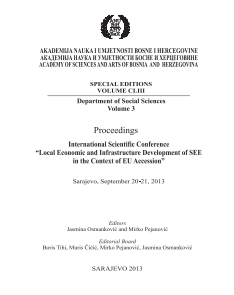LOCAL COMMUNITIES AND REFORM OF TERRITORIAL ORGANIZATION: CASE OF BOSNIA AND HERZEGOVINA
LOCAL COMMUNITIES AND REFORM OF TERRITORIAL ORGANIZATION: CASE OF BOSNIA AND HERZEGOVINA
Author(s): Marijana Galić, Ensar Šehić, Jasmina Osmanković
Subject(s): Politics, Constitutional Law, Governance, Government/Political systems, Economic development
Published by: Akademija Nauka i Umjetnosti Bosne i Hercegovine
Keywords: Local community; Territorial organization; Bosnia and Herzegovina; Reform;
Summary/Abstract: Interaction between local economic development and reform of territorial organization is the topic of this paper. In this paper we research the problem of negative reflections, quality and instability of territorial organization on the local economic development. Aim is to identify the problem, its input and output. Timeframe is period 1952-2013, with focus on 1990, 2000 and 2010. Spatial frame of the research is Bosnia and Herzegovina and other countries in region. Main hypothesis is: number of local units (communities) is increasing in time of instability. In this paper we used DEA method of analysis and other relevant methods. Paper consists of: abstract, introduction, overview of territorial organization, evaluation of efficiency of territorial organization applying Data Envelopment Analysis, conclusion, and resources. Authors research transformation in territorial concepts from nation building to concessions, interaction of geographical and territorial vision facing the crisis, objective and framework for territorial development in different states, territorial organization and territorial cohesion between expectations, disparities and contradiction, territorial organization of society and territorial structure of a state from state to local level, the quest for new territorial paradigms in an interconnected world economy, and other. Main question in this paper is: Is it possible to give the territorial dimension more relevance for choices of competitiveness, efficiency and sustainable policies?
- Page Range: 235-244
- Page Count: 10
- Publication Year: 2013
- Language: English
- Content File-PDF

